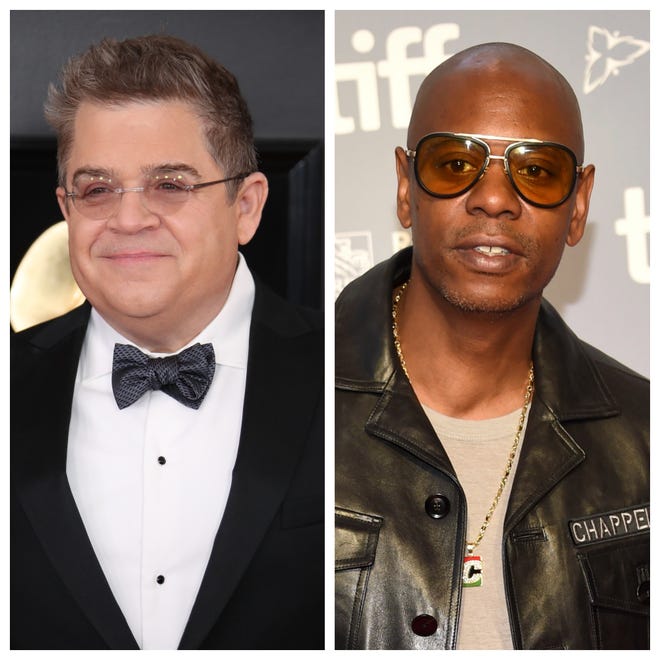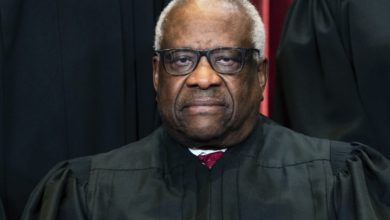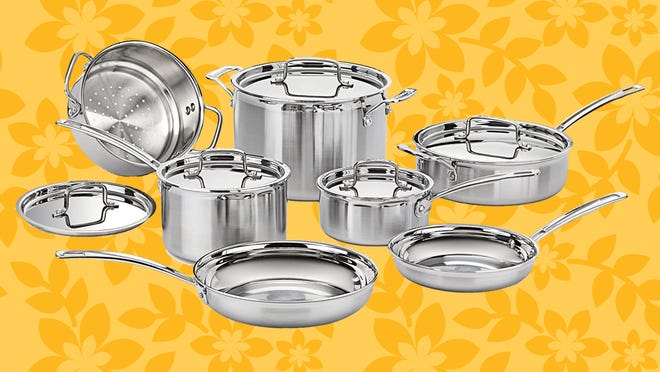
A world where everyone enjoys the same favorite flavor of ice cream. Where everyone can't stop giggling at the same joke. Where everyone votes for the same politician.
That world will never exist – and it probably shouldn't. But a world where everyone respects each other's differences might be possible. Emphasis on the "might."
At least that's what Patton Oswalt tried to say. The comedian faced backlash after he shared a photo on Instagram with his friend Dave Chappelle, whose 2021 comedy special "The Closer" prompted an outpouring of criticism regarding its transphobia (though it hasn't "canceled" him, as some suggested it should have).
Oswalt wrote a nuanced follow-up post where he discussed his 34-year friendship with Chappelle and set the record straight on his own beliefs: "For all the things he’s helped ME evolve on, I’ll always disagree with where he stands NOW on transgender issues. But I also don’t believe a seeker like him is done evolving, learning. You know someone that long, see the struggles and changes, it’s impossible to cut them off. Impossible not to be hopeful and open and cheer them on. Also, I’ve been carrying a LOT of guilt about friends I’ve cut off, who had views with which I couldn’t agree, or changed in ways I couldn’t live with. Sometimes I wonder — did I and others cutting them off make them dig their heels in deeper, fuel their ignorance with a nitro-boost of resentment and spite?"
Oswalt's approach marks an example of what it means to agree to disagree with your friends on an individual level, experts say, but people must determine their tolerance for views that don't align with their own.
Could this also be the antidote to cancel culture?
When people sit stuck in their antiquated ways, "we must not cancel them quickly, we must call them higher and challenge them to evolve with the culture," says therapist Moe Ari.
Hmm:It’s time to cancel ‘cancel culture.’ Call it ‘accountability culture’ instead.
Friendship isn't a one-size-fits-all kind of relationship. One person's ability to tolerate a behavior or attitude won't necessarily match up with someone else's.
"For some people, the fact that someone might disrespect an identity that they feel important, or a cause that they feel important, is enough of a con that they can't consider them as a friend," says Marisa Franco, psychologist and friendship expert. "But for other people, that's not the case."
It's certainly not for Vincent Messina.
"I'm married to a person I disagree with on almost a daily basis," the 44-year-old Connecticut resident says.
He adds: "This idea that we should instantly condemn anyone who does not share a specific opinion is insanity. In fact, the goal should be the opposite."
Anthony Lodestro, 46, says Oswalt is spot-on in not letting a 30-year friendship go – though that hasn't always panned out in his own life.
"I had a friend who knew me and my family since 1983 drop any communication, friendship because I didn’t support (former president) Trump in his re-election bid," the New York resident says. "I’m a Democrat by nature but don’t always vote blue. That being said I’m still very close to a friend who would hug Trump if he were standing in front of us. Still love him and his value to my life and family."
In case you missed:Patton Oswalt reflects on Dave Chappelle friendship, disagreeing on transgender rights
Sustaining friendships and supporting 'cancel culture' is not the same thing
Maintaining an individual friendship and holding someone accountable in the public square remain very different animals.
"There are different implications for supporting somebody who may be speaking out against trans folks" says Jennifer Billinson, an assistant professor of communication at Christopher Newport University. She notes last year was the deadliest on record for trans and nonbinary people.
In the case of Oswalt and Chappelle – and any celebrity, for that matter – there's only so much the public can understand about who these people are.

"Oswalt’s reflection remind us that one of the biggest myths is that we the public know celebrities through their loudest moments," says Jeffrey McCune, director of the Frederick Douglass Institute for African and African-American Studies at the University of Rochester.
And as Ari says, still "I am always happy to see people not reject their friends when they need them most."
Something to think about:Obama, Alton Brown apologized for harmful words. Should we forgive past problematic views?
What to do when you and a friend fundamentally disagree
Take the temperature of your relationship. Is your friendship filled with more positive emotions or negative ones? "These are friendships we're choosing. So they need to feed us and bring us joy," says Shasta Nelson, friendship expert. Also consider your friend's reliability and consistency, as well as how vulnerable you feel around each other.
Consider cutting your losses. "We just need to give ourselves the space and the room for our own subjectivity in assessing whether it's worth continuing these sorts of friendships," Franco says.
Be prepared to accept your friend – warts and all. "It's unrealistic to think that we can find people who agree with us on every single thing, and that we all grow and change our minds and opinions at the same pace at the same time," Nelson says.
Move forward. Staying in the relationship could help your friend grow further, could help you practice your own capacity for compassion and overall could foster a world where conversation is more likely to happen, Nelson says.
Given all the arguments going on in the world today, we all could use more friendship. Choose your fights carefully.
As Nelson says: "We can't just keep cutting out every single person who disappoints us or hurts us."
'You will not summon me':Dave Chappelle on engaging with trans community; fired Netflix employee speaks









